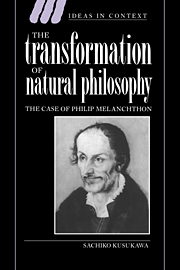Book contents
- Frontmatter
- Contents
- List of illustrations
- Notes on the text
- Acknowledgements
- Introduction
- 1 The way of the Schoolmen
- 2 Law and Gospel: the reforms of Luther and Melanchthon
- 3 The soul
- 4 The Providence of God
- 5 The construction of orthodoxy
- Conclusion: a transformation of natural philosophy
- Bibliography
- Index
- IDEAS IN CONTEXT
Conclusion: a transformation of natural philosophy
Published online by Cambridge University Press: 06 November 2009
- Frontmatter
- Contents
- List of illustrations
- Notes on the text
- Acknowledgements
- Introduction
- 1 The way of the Schoolmen
- 2 Law and Gospel: the reforms of Luther and Melanchthon
- 3 The soul
- 4 The Providence of God
- 5 The construction of orthodoxy
- Conclusion: a transformation of natural philosophy
- Bibliography
- Index
- IDEAS IN CONTEXT
Summary
One last word. Wanting to make the sixteenth century a skeptical century, a free-thinking and rationalist one, and glorify it as such is the worst of errors and delusions. On the authority of its best representatives it was, quite to the contrary, an inspired century, one that sought in all things first of all a reflection of the divine.
Lucien Febvre, The Problem of Unbelief in the Sixteenth Century: The Religion of Rabelais, trans, by Beatrice GottliebPhilip Melanchthon transformed the natural philosophy which was traditionally taught by the Schoolmen at universities into a Lutheran one. The late medieval Schoolmen frequently commented upon Aristotle's books on nature with the quaestio method and appealed to the authority of Aristotle, the Schoolmen and the Church. As part of university learning, natural philosophy contributed towards knowledge of God and alongside metaphysics it was an essential area of knowledge for theologians. The system of thought of the Schoolmen, tightly knit together by means of logic, was ultimately based on a conviction that rational knowledge about God was possible and necessary. Hence natural philosophical arguments were legitimately used to prove, elucidate and maintain theological points.
In contrast, Luther denied the validity of human rational knowledge as a support for theology. Human reason on its own could not affirm theological truths. Natural philosophy of the late medieval Schoolmen was therefore rejected by Luther and Melanchthon – it could not teach the message of the Gospel. Instead, Melanchthon's natural philosophy was knowledge of Law in the sense that it provided the theoretical foundation of his moral philosophy of civil obedience.
- Type
- Chapter
- Information
- The Transformation of Natural PhilosophyThe Case of Philip Melanchthon, pp. 201 - 210Publisher: Cambridge University PressPrint publication year: 1995



